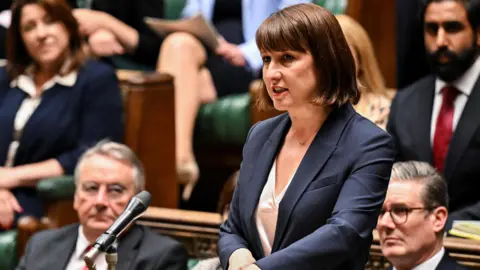Business reporter, BBC News
 Getty Images
Getty ImagesThe chancellor will give an update on her plans for the UK economy and an economic forecast when she makes her Spring Statement, on Wednesday 26 March.
Rachel Reeves has previously ruled out further tax rises, but faces difficult choices because of the performance of the UK economy and world events.
What is the chancellor expected to announce?
Reeves has committed to one major economic event each year – the Budget. This is to give families and businesses “stability and certainty on tax and spending changes”.
As a result, government sources have been keen to stress that the Spring Statement is not a major financial event.
Reeves has ruled out “tax and spend” policies, signalling that she will neither raise taxes nor government budgets.
However, with the government under pressure over its finances, she is expected to announce spending cuts. Some big changes aimed at saving money have already been announced.
The chancellor has pledged to cut government running costs by 15% by the end of the decade, with about 10,000 civil service jobs expected to go.
Spending cuts of £5bn year by 2030 from the welfare bill have also been announced prior to the Spring Statement.
Policies include stricter tests for personal independence payments, affecting hundreds of thousands of claimants, and a freeze on incapacity benefits, but some more detail could be revealed.
The chancellor is likely to argue the “world has changed” in defence of her choices.
Defence spending itself is set to increase to 2.5% of national income by 2027. Reeves could also confirm details of how international aid funding will be reallocated to fund the rise.
Tax rises have been repeatedly ruled out by the chancellor, but UK taxes on big firms could be changed as part of a deal to avoid US trade tariffs.
Reeves has revealed talks are “ongoing” about tweaks to the 2% Digital Services Tax (DST), which raises about £800m a year from global tech giants such as Amazon and Meta.
While some announcements have been made public, there remains the possibility the chancellor will delay the exact details of changes to the Spending Review in June, or even the next Budget in the autumn.
How will the day play out?
Before Reeves makes her statement in Parliament, the Office for Budget Responsibility (OBR), which monitors the government’s spending plans and performance, will publish its forecast on the UK economy.
It will also provide estimates on the cost of living for households and whether it thinks the government will stick to its self-imposed rules on borrowing and spending.
Reeves will present the watchdog’s main findings and make her Spring Statement on her plans for the economy alongside this.
After she has spoken, the opposition, likely to be either Conservative leader Kemi Badenoch or shadow chancellor Mel Stride, will respond.
What about Reeves’s borrowing rules?
Reeves has two main rules on borrowing:
- Not to borrow to fund day-to-day public spending
- To get debt falling as a share of national income by the end of this parliament
She has repeatedly said her rules are “non-negotiable”.
However, the OBR’s forecast is expected to confirm that the £9.9bn financial buffer to meet her budget rule by the 2029-30 financial year has been wiped out.
The pressure on Reeves grew on Friday, when it was announced that UK government borrowing was higher than expected in February, at £10.7bn.
The economy is seen to be underperforming, thanks in part to global factors indirectly affecting the UK such as US trade tariffs.
This has fuelled further speculation over whether the chancellor will break her self-imposed borrowing rules.
How is the UK economy doing?
Recent figures show UK economic growth has been weak.
The economy grew by just 0.1% between October and December 2024, while the latest monthly figures show it contracted by 0.1% in January.
When an economy grows, more businesses can employ extra workers or give pay rises. Firms making higher profits also pay more in tax to the government, which can be spent on public services.
In addition to slow growth, prices are also rising faster than wanted.
The current inflation rate of 3% is higher than the Bank of England’s 2% target and is forecast to go higher.
Inflation could affect whether interest rates are lowered further from 4.5% as the Bank moves rates in response to inflation.
Higher rates mean higher borrowing costs for loans, credit cards and mortgage deals, but it also provides better returns on savings.
Costs for businesses are expected to jump in April, when National Insurance contributions paid by employers rise. These could be passed on to consumers.
UK government borrowing costs also remain higher than this time last year.
Reeves has also warned that a potential global trade war, with the US imposing tariffs worldwide, would lower growth and raise inflation. In the UK, a 25% tariff has been placed on steel and aluminium products.




